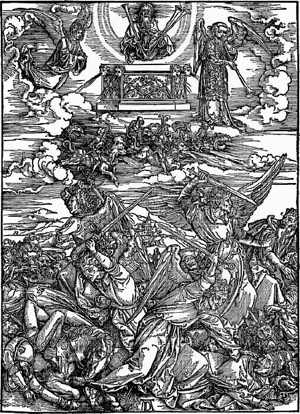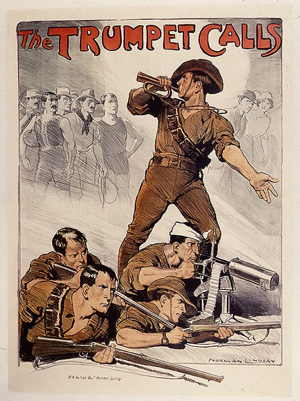
War and Music
[Created: 3 Jan. 2022]
[Updated: January 31, 2023 ] |
 Albrecht Dürer "The Sixth Trumpet" from the Apocalypse |
 Norman Lindsay WW1 recruiting poster (1918) |
This is part of a collection of material on my course "Responses to War".
A. INTRODUCTION
Music has been a powerful means of expressing a variety of emotions inspired by war and peace. First, there is the patriotic or celebratory work which is designed to inspire men to fight for their country or to justify past conflicts. National anthems like the French "Marseillaise" are bloodthirsty examples of this kind of martial music. These works have usually been composed by "court composers" in the pay of the crown or the state. Secondly, there is the music of the soldiers themselves, invented or adapted for marching to war, lamenting one's separation from home and loved ones, for passing time during frequent periods of inactivity or for expressing their resentment of the incompetence of their leaders and the fate that led them to the battlefield. Thirdly, there is the music of the protesters, mostly civilians though sometimes veterans as well, who use song to oppose conscription, the killing of innocent bystanders, those who profit financially and politically from war, and sometimes even to oppose war itself. Finally, there are the composers who use music to express the sorrow and pity of war, to commemorate those who have died, and to use the emotive power of music to condemn war and the folly of men who make war. I use music frequently in the teaching of this subject to show how music has been another ideological weapon in the debate about war and peace over the centuries and as yet another example of the pervasive impact war has had on our culture.
This Guide lists some recommended reading and works of music and song, many of which I have played in the lectures. Personal favourites of mine are:
- Anonymous 15thC song "L'Homme armé" - the lament of an armed man in time of war
- Rouget de Lisle's "La Marseillaise" (1792)- the first verse of this great, bloodthirsty national anthem
- Ludwig van Beethoven's "Eroica Symphony" (1803) - the finale to Beethoven's celebration of the Promethean hero Napoleon before he crowned himself emperor
- Benjamin Britten'sWar Requiem (1962) - a sung version of a Wilfred Owen poem and the "dies irae" from the Requiem Mass
- Dmitri Shostakovich's War Symphonies - no. 7 "Leningrad Symphony" (1941) and "Stalingrad" Symphony No. 8 (1942) - an onomatopoeic depiction of the Nazi invasion of the Soviet Union
- Jimi Hendrix's rendition of "The Star Spangled Banner" - a controversial rendition of the American national anthem with Hendrix's recreation on his electric guitar of the sounds of battle
- John Williams' muisc for the "Star Wars Trilogy" (1977-83) - the martial music for the final scene of the film which takes place in the "Throne Room" where the heroes of the Republic are presented with medals for bravery
B. TABLE OF CONTENTS
C. RECOMMENDED READING
Ben Arnold, Music and War: A Research and Information Guide (New York: Garland, 1993).
Peace Songs: WMA Anniversary Collection, ed. John Jordan (London: Kahn and Averill, 1989).
R. Serge Denisoff, Songs of Protest, War and Peace: A Bibliography and Discography (American Bibliographical Center-Clio Press Inc., Santa Barbara, California, 1973).
Rowland Cotterill, "War and Music in the Sixteenth Century" in War, Literature and the Arts in Sixteenth-Century Europe, ed. J.R. Mulryne and Margaret Shewring (Basingstoke: Macmillan, 1989), pp. 63-77.
The Rock Music Source Book, ed. Bob Macken, Peter Fornatale and Bill Ayres (Garden City, NY: Anchor Books, 1980). See entries for "War and Peace", pp. 444-60.
The Rambling Soldier: Life in the Lower Ranks, 1750-1900, Through Soldiers' Song and Writings, ed. Roy Palmer (Penguin: Harmondsworth, 1977).
D. WORKS TO CONSIDER
The Ancient World
Armageddon
Olivier Messiaen's "Quartet for the End of Time" (1940).
The Trojan War and Music
Hector Berlioz's operatic treatment of war in a classical context: The Trojans (1856-8).
Sir Michael Tippet's opera King Priam (1962)
Roman Military Leaders
Katchaturian's Ballet Spartacus (1958, 1968)
George Frederick Handel's Opera Julius Casear (1724)
The Medieval Period
Wagner - Parsifal, Tristan and Isolde, Ring cycle of operas
The Musical "Camelot"
"Music of the Crusades," The Early Music Consort of London, David Munrow (Decca, 1970)
Honegger's Oratorio Jeanne au Bûcher (1938)
The Early Modern Period
16th century Europe
War of the Hymns - Luther's "Ein feste Burg vs Catholic "Te Deum"
Josquin Desprez (1440-1521): Missa "L'homme armé" (late 15thC) in "L'homme armé (1450-1650): Music of War and Peace (Boston Camerata, Joël Cohen, Erato 1986)
"musical combat" - Andrea Gabrielli (1520-1586), Bataglia: Sento un rumor and Tilman Susato (d. 1561), Pavanne: La Bataille.
Roland Lassus (1532-1594), In hora ultima
Claude Goudimel (1514-1572), Ô combien est plaisant. (Psalm 133).
30 Years War of the 17thC
Carl Maria von Weber (1786-1826), The Freischütz (1821).
Richard Strauss (1864-1940),
- "Festival Music in Living Scenes" (1892)
- opera "Rosenkavalier" film of 1925 1940 "Battle and Victory Music"
- chamber opera "Day of Peace" 1935
Heinrich Schütz (1585-1672).
- "L'homme armé (1450-1650): Music of War and Peace (Boston Camerata, Joël Cohen, Erato 1986)
- "Es ging ein Sämenn auss "
Karl Amadeus Hartmann (1905-1963)
- symphonic poem "Miserae" - Dachau 1935 cantata "Anno 48" based on poems by Gryphius
- opera "The Youth of Simplicius Simplicissimus" 1934 - Simplicius Simplicissimus. Drei Szenen aus seiner Jugend nach H.J. Chr. Grimmelshausen von Hermann Scherchen, Wolfgang Petzet und Karl Amadeus Hartmann (1934-35) (Wergo, 1995).
The Eighteenth Century
Imperial Britain
George Frideric Händel (1685-1759)
- The Messiah (1741)
- Dettingen Te Deum (1743)
- "See the conquering hero come" in "Judas Maccabeus"
James Thomson's "Rule Britannia" (1740) in "Last Night of the Proms" 100th anniversary concert
American Revolution
Music and the War of 1812 "The Defence of Fort Henry" or "The Star Spangled Banner" (1814) by Francis Scott Key (1779-1843)
French Revolution
Rouget de Lisle's "La Marseillaise" (1792)
The Nineteenth Century
Napoleon
Ludwig van Beethoven's attitude to war, the French Revolution and Napoleon:
- the Eroica Symphony (1803).
- "Wellington's Victory" (The Battle of Victoria) Op. 91 aka "Battle Symphony" (1813)
Peter Ilyich Tchaikovsky (1840-1893) - "1812 Festival Overture" Op. 49 (1880)
Slave Revolts and Abolition of Slavery
"John Brown's Body"
America's Favorite Ballads ... As Sung by Pete Seeger (New York: Oak, 1961), p. 62.
Paul Robeson, Ballad for Americans, and Great Songs of Faith, Love and patriotism (Vanguard CD 1965, 1989)
The American Civil War
CD: Songs of the Civil War: First Recordings from Original Editions, The Harmoneion Singers and Lawrence Skrobacs, piano (New World Records, 1976).
Hopkins' New Orleans 5 Cent Songbook vs Beadle's Dime Songs for the War
Antislavery Songs
- "John Brown's Body"
- Henry Clay Work's "Kingdom Coming"
Political Rallying Songs
- Julia Ward Howe's "Battle Hymn of the Republic"
- Dan Emmett's "Dixie"
- George F. Root's "The Battle Cry of Freedom" (1862)
- Harry McCarthy's "The Bonnie Blue Flag" - semi-official Southern anthem
Songs about Political and Military Leaders
- Jesse Hutchinson's "Lincoln and Liberty"
- John W. Palmer's "Stonewall Jackson's Way"
- Charles and J.E. Haynes's "Sherman the Brave"
Battle and Campaign Songs
- J. Harry Heyward and Thomas D. Sullivan's "The Flag of Fort Sumter"
- Will S. Hayes' "The Drummer Boy of Shiloh" and "Life on the Vicksburg Bluff"
- Henry Clay Work's "Marching through Georgia"
The Life of Ordinary Soldiers
- Henry Clay Work's "Grafted into the Army"
- "Goober Peas" and "The Army Bean"
- Septimus Winner's "Johnny is Gone for a Soldier"
- Henry Clay Work's "Corporal Schnapps"
The Emotion of War: Separation and Grief
- J.P. Webster's "Lorena"
19thC British Imperialism
Gilbert and Sullivan
Jingoistic popular songs
The Two World Wars
The First World War
Benjamin Britten
- his combination of Owen's poetry and the Latin Requiem Mass: War Requiem (1962).
- Cantata misericordium 100th anniversary of founding of Red Cross
- television opera Owen Wingrave (1971)
The Spanish Civil War
the Republican "Songbook of the War in Spain With Contributions of the Finest Poets in Spain" (1937). Music in Nazi Germany
Nazi marching songs - the Horst Wessel song
Richard Wagner (1813-1883) and the Bayreuth Festival
Court Composers, Conductors, Performers - Wilhelm Furtwängler (1886-1954), Richard Strauss, Walter Gieseking
Jazz as music of resistance or opposition
The Second World War
Soviet Union
- Dmitri Shostakovich's reactions to Stalin and the Nazi invasion of Russia:
- Testimony and the War Symphonies - no. 7 "Leningrad Symphony" (1941) and "Stalingrad" Symphony No. 8 (1942): requiem for the dead
- Sring Quartet no. 3 in F major, opus 73 (1946).
- Alexei Surkov's popular song "In a Dug-Out" (Stalingrad Nov 1941)
- Serge Prokoviev
- symphonic suite "The Year 1941"
- 5th Symphony
- Opera "War and Peace"
The Holocaust
- Jens Gerlach et al. "A Jewish Chronicle" (1960)
- Dmitri Shostakovich (1906-1975)
- "From Jewish Folk Poetry" (1948)
- Symphony No. 13 "Babi Yar" (1962)
- Henryk Gorecki (1933), Symphony No. 3 "Symphony of Sorrowful Songs" (1976)
- Ronald Senator, "Holocaust Requiem: Kaddish for Terezin"
- Arnold Schoenberg, "A Survivor from Warsaw" OP. 46
- Krzysztof Penderecki, "Dies Irae: Oratorio in Memory of the Victims of Auschwitz" (1947)
The USA
- "Something for the Boys": War and Popular Songs
- "Hip Hip Hooray - We're Livin' in the USA"
- "Praise the Lord and Pass the Ammunition"
- "When those little yellow bellies meet the Cohens and the Kellys"
- "There Won't Be A Shortage of Love"
- "Rosie the Riveter"
- "There'll Be Blue Birds Over The White Cliffs of Dover"
- "Ev'ry Body Ev'ry Payday, Buy Buy Bonds"
- Maxene Andrews (Andrews Sisters) - "Boogie Woogie Bugle Boy" - James Morrison - "The Australia Remembers Gala Tribute" Ch 2 13.8.95.
- Something for the Boys: The Songs of World War II (Vintage Jazz Classics, 1992)
- Glen Miller and the Army Airforce Orchestra, The Legend (Prism 1987)
Music Inspired by the Atomic Bombs
- Masao Oki: "Give Back Mankind" and "Symphonic Fantasia Hiroshima" (1954)
- Krzysztof Penderecki, "Threnody for the Victims of Hiroshima" (1962)
The Cold War
Musical Satire: Tom Lehrer, "That Was the Year that Was" (1965)
So Long, Mom (A Song for World War III)
Who's Next?
Werner von Braun
Jazz in the Cold War
Bill Evans, "Peace Piece" (1958)
Charles Mingus, "Prayer for Passive Resistance" (1960) and "Oh Lord, Don't let them drop that Atomic Bomb on me" (1961)
TheVietnam War
Patriotic Rock and Pro-War Country and Western
Staff Sergenat Barry Sadler "The Ballad of the Green Berets" (1966) no. 1 hit and gold record
Bruce Springsteen "Shut Out the Light" (1985), "Born in the USA" (1985)
Protest Songs: The Songs they Don't Play on the Radio
Folk Protest
- Woodie Guthrie (1912-1967)
- Pete Seeger (1919- ) and The Weavers
- Phil Ochs (1940-1976)
- Bob Dylan (1941- )- Robert Zimmerman
- Joan Baez (1941- )
Rock Protest
- The Doors "Univesal Soldier" (Buffie Saint-Marie)
- The Byrds "Draft Morning" and "Wasn't Born to Follow"
- Creedence Clearwater Revival "Fortunate Son"
- Crosby, Stills, and Nash, "Wooden Ships"; "Four Dead (Ohio)
- Emerson, Lake and Palmer "Lucky Man"
- Black Sabbath "War Pigs"
- David Bowie "Running Gun Blues"
- Country Joe McDonald (1942- ) - Country Joe and the Fish
- Eric Burden and the Animals
- John Lennon (1940-80)
- Jimi Hendrix (1942-1970)
Political "Black Music"
- Edwin Starr "War" and "Stop the War Now" (1970) no. 1
- The Temptations "Ball of Confusion" (1970) no. 3
- Marvin Gaye "What's Goin On" (1971) no. 2
- Stevie Wonder "The Front Line"
- blues John Lee Hooker "I don't want to go to VN" (1969)
Punk and Post-Punk
- The Clash "Charlie Don't Surf" (1980) and "Straight to Hell" (1982)
Wars of the Future
John Williams' muisc for the Star Wars Trilogy (1977-83)